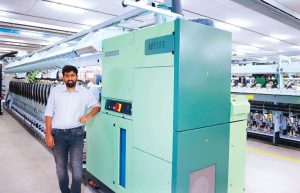
MKAS Textile selected the Autoconer X6 Multilink from Rieter for an economical boost to production.
TW Special Report
India-based MKAS Textile Pvt. Ltd. entered the country’s fine yarn spinning business in 2021 and now achieves a production capacity of 4.5 tons per day. The company sells 100-percent cotton yarns made from high-quality cotton fibers in the yarn count range between Ne 80 to 100 for weaving applications. As part of its strategy to establish itself in this market, MKAS Textile chose Switzerland-based Rieter’s winding machine Autoconer X6, type V Multilink as a highly economical, energy-saving automation solution.
Given limited resources like skilled operators and high-quality raw materials, it is a major challenge to ensure a consistently high level of quality. Rising energy costs further make it difficult to achieve acceptable production costs when meeting the demanding requirements of the market.
Optimal Space Utilization
MKAS Textile opted for a high degree of automation with the Autoconer X6 Multilink system. To plan the most effective and optimal spinning mill layout, Rieter experts discussed the requirements with the company’s management and technicians. Due to the attractive benefit on investment and operating costs, MKAS chose eight winding machines Autoconer X6, type V with automatic material flow as 2:1 Multilink for 52 winding units each. This means that two ring spinning machines are linked to one Autoconer. To respond to MKAS Textile’s individual needs for maximum space utilization one winding machine was added as 1:1 direct single-link — 26 winding units. On specification, the company chose the underfloor link where the cops and spinning tubes move underground between the ring spinning machine and the winding machine. This creates a passageway for operators between the two machines and makes the machine handling easily manageable.
Lower Energy And Investment Costs
The spinning mill now runs at full production. Mohamed Suhil, MKAS Textile’s managing director, stated that he is highly satisfied with the Autoconer X6 Multilink installation. “The lower investment costs and, above all, up to 25 percent lower energy costs in operation, are extremely important aspects for us, for a profitable business,” Suhil added. “This allows us to establish ourselves as a new spinning company with high-quality products in a difficult and demanding market.”
The investment costs of 2:1 Multilink mill installation of 442 winding units, tailored to their layout specification, were significantly lower than as 1:1 direct single-link of 442 winding units, due to optimum quantities of machines, components and aggregates.
Twenty-Five Percent Lower Energy Consumption
Recently, MKAS Textile conducted an energy study comparing its 1:1 single-link machine and 2:1 Multi-link system. Around 25 percent lower energy consumption in favor of the Multilink machines was measured. This means savings of 238,750 kilo-Watt hours (kWh) per year, which corresponds to an annual energy cost saving of 1,910,000 Indian rupees ($22,630) based on the company’s daily production of 4.5 tons, 362 working days per year, and 8 rupees per kWh.
Bigger Working Area For Operators
Furthermore, the Multilink system achieves major benefits in terms of labor saving thanks to the longer winding machines and optimized mill layout. Instead of four operators, it now only takes two operators to man-age the tasks for the eight Multilink winding machines. This means one operator can handle four Autoconers — seven 296 ring spinning spindle production — which translates into a doubling of the working area.
2024 Quarterly Issue IV




